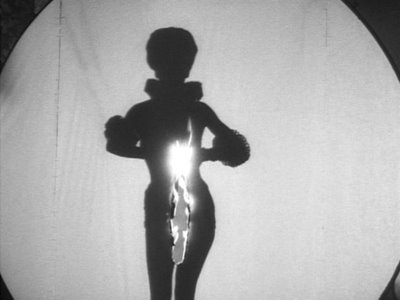applied music
| Feeling better: doing ok w/ the differently-delivered nicotine (remind me to explain how I came to start smoking, like an idiot, when I was 27), and it turns out that I didn't have tonsillitis (no redness = no bacteria) but a mild, similarly-symptomed virus. ***  "Some girls go for flowers and romance/I'm not taking a chance/my flame is for a general." Carole Landis as "Sweet Loretta" pantomimes "The Flame Song" from A Scandal In Paris (1946, Douglas Sirk). A strategically placed wave of the candle --  -- and she steps through the screen:  a decade before Imitation of Life and "Stop acting, Mother!" As metacinematic as the above scene is, this assured and completely enjoyable film has little of the distinctive above-the-material quality we call "Sirkian" -- which suggests that while auteurists might have been right in discerning a "system" in the '50s films, it might have been more accurately called "Sirk-Hunter-Hudsonian"; the compromise/collaboration of directorial "genius" with a producer and bankable star with agendas of their own is exactly what made those films possible. Here, the star is George Sanders, classical Hollywood's greatest cad/dandy long before All About Eve (see, for one, the nearly contemporary The Private Affairs of Bel Ami (Alfred Lewin, 1947)), and the tone is for the most part light and Lubitschy, as are the aphorisms ("The chains of matrimony are sometimes so heavy they must be carried by three"). But there are also passages of entirely non-comic suspense, which Sirk would master immediately afterward in Lured (also 1947), and a violent scene involving an outlandish "Chinese carousel" that anticipates Strangers on a Train by a few years. The song? As you might have guessed, it's styled after "Naughty Lola," with Landis' hoarse vocal making the object of satire hard to misrecognize. All this is fairly anachronistic, as the film is set in 1770s Paris, where "cabaret" as we understand the term was not invented for another century or more, but it's still a good number. The music is by none other than Hanns Eisler: the score, not his last for Hollywood but close, is unchallenging but notably well-integrated (that "Chinese carousel" gets a theme of its own), and this is the only free-standing song of his from such a project that I've come across. The lyric -- which is serviceable but not brilliant -- is by Paul Francis Webster, whose name is far less well-known than those of his co-writers (Ellington, Carmichael, Previn) or his songs: "I Got It Bad And That Ain't Good," "Baltimore Oriole," "The Shadow of Your Smile," "Love is a Many-Splendored Thing," and, of most personal significance to me, the 1967 theme song from Spider-Man. (Its composers, Bob Harris, Stu Phillips, and D. Kapross, are truly obscure.) I'd have liked to include some audio, but the only result of an hour of fussing with DVD-ripping programs has been that I learned a new word. (Tech-tip/intellectual property digression: even the frame captures were tricky. Mac's own screengrap app, you may someday notice, has the lovely "feature" of disabling itself while a DVD is running. Of course, no one can stop you from taking a digital photo of your own computer; but downloading a program called SnapNDrag is even easier.) Given my failure, we'll both have to rest with Vernon Duke and Ogden Nash's "The Sea-Gull and the Ea-Gull"; not especially a Dietrich parody as written, but certainly as performed on a recently reissued 1955 LP by Charlotte Rae. (Let's not forget that Mrs. Garrett has played both Brecht and Beckett.) Listen below and/or download here. *** I said I was feeling better, not that I was 100% coherent. |
